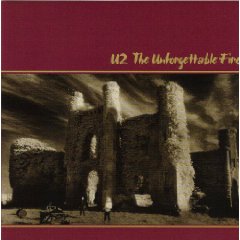When 1984 eventually arrived, it didn’t seem so Orwellian. Pop was bright and fizzy and segued into a mainstream rock that, in our naiveté, we thought might make a major difference to the world. Well, with Band Aid, it did, at the close of that year, even if our belief in the collective goodness of rock glitterati was somewhat misplaced.
There was everything else and there was U2. October saw the arrival of The Unforgettable Fire and, as an omnipresent force it seemed to hang in the air until finally fading before the all encompassing Joshua Tree in March 1987. Two and a half fat years of supremacy — although, if I’m completely honest, I’m not entirely certain that I ever sat down and listened to the thing. One didn’t need to, really — it was just THERE.
Can’t say that I was a U2 fan either. This was I truly believed — a clunky, cumbersome, gargantuan juggernaut. One preferred to languish with the Smiths, New Order, the Bunnymen and The Cure. There I would find a warming humility; U2, by contrast, seemed cold, distant, irrelevant, lost.
Well perhaps no more. One of the positive aspects of this ‘deluxe’, remastered, repackaging, reselling process is that it at least allows us a chance to re-evaluate. And with U2’s The Unforgettable Fire, this proves to be a very strange experience indeed, for me. Either the frequency of this music has shifted on its axis, or my personal hearing has slipped; I sense the latter. There is no doubt that, for all the majesty of this music, it would dull my senses, back then — but not now. Now I find an urgency. These songs seem younger and, in places, downright weird.
Could this music really have commanded the mainstream back then? Somewhat embarrassingly, I’ve just spent a full weekend driving between Manchester and Liverpool, blasting the songs from my car (and the good people of Warrington are not noticeably fond of peak period U2). Ironically, while The Unforgettable Fire cemented their gargantuan arrogance, it also saw U2’s music crumble away into an unexpected experimentalism. Much of this was due to producers Brian Eno and Daniel Lanios, who famously dismantled the solid notion of a huge symmetrical rock band; as such, the giant sound that had filled the preceding album, the live Under a Blood Red Sky, was fragmented, scattered here, leaving only the single ‘Pride (In the Name of Love)’ to continue the band’s natural trajectory.
It is also to the producer’s credit that the combined elegance of these four remarkable musicians remains in evidence throughout, even if their natural dynamic must have been sorely tested. One listens now to Larry Mullen’s extraordinarily frenetic hi-hat technique, now used — the producers’ idea, this — to explosive effect on the full kit. Track three, ‘Wire’, remains one of U2’s finest moments: bombastic, percussive, fizzing with nervous tension and pushed further into weirdness by The Edge’s chopping guitar. How strange, just one song later, to find this direction reversed to the soft, mulled elegance of the famous title track, a masterpiece of gentle, radio-friendly production. Here, and for once, the remastering is most welcome, for allowing The Edge’s eerie trademark to drip over myriad sounds and sensations that had always escaped me. Only the Trevor Horn-style orchestral snatch serves to anchor it to its 80s home.
Other highlights include the eternal ‘Bad’, still part of their live set, and the raw ("too raw" The Edge states in the sleeve notes) ‘Elvis Presley and America’, a song left in embryonic nervousness. This too, is a curious approach for producers attempting to make a vast commercial album. Not that it seemed to affect sales: The Unforgettable Fire, for all its inherent weirdness, simply floated to instant success.
The band that lay beyond this work can be glimpsed on the CD that accompanies this deluxe edition: a comparatively lo-fi demo-land that offers a lovely naïve contrast. The dub elements seem almost sweet here, and there’s a nakedness that one welcomes — especially as 2009 sees the band surging into unprecedented areas of live show excess. But listen to ‘A Sort of Homecoming (Live)’, or ‘Love Comes Tumbling’ or the angry ’11 0’Clock Tick Tock’ (minus Martin Hannet’s misplaced doodling) and you hone in on the one thing that made U2 unique in the first place: four equally deft musicians pushing their luck, lost to the possibilities.
Not so, now. Big, big, big live shows do not dominate my diary, to be honest: I’m still not a fan. The sheer bloody arrogance of the juggernaut still leaves me cold — though one can only be thankful that Brian Eno has been allowed to peddle his mischief. Well, this is the album that began all that. People less allergic to the full-blown Bono than myself do seem to agree with my claim that this remains U2’s most intriguing album (alongside Achtung Baby, perhaps). The fact that I can stand to listen to it at all (I cannot, will not go near The Joshua Tree, which contained no such experimentation) is testament to its allure. I missed it first time around but am liberal enough to enjoy it here, now, in its state of unlikely relevance.


